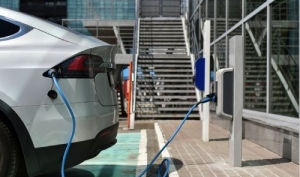Clean Energy Canada | The real problem with electric vehicles is the bad press they get
March 11, 2024

There is indeed a problem with electric vehicles — only it’s not a problem with the vehicles themselves.
EVs can scarcely stay out of the news and off social media these days, and while that much exposure for a key climate solution is positive in one respect, in another, it is — more often than not — increasingly negative.
A recent study of more than 12,000 climate-related YouTube videos posted since 2018 found that old-fashioned climate denial — think “global warming is fake” — has been replaced by another breed of dissent. While straight-up denying the existence of climate change has declined by a third (harder to do when we’re all feeling it), videos discrediting climate solutions, like EVs, have more than tripled.
But it’s more than algorithm-driven misinformation underpinning the aforementioned EV problem. Too often, it’s also the news coverage EVs receive. This particular problem is not one of bad intentions or even bad incentives, but with the very mechanics of journalism — of what makes news and what does not.
For example, there’s a decent chance you read one headline or another about Teslas piling up at public chargers in Chicago during January’s wicked cold snap. While most EV drivers charge at home, sidestepping this issue entirely, the story is also missing some key context: a recent study in Norway, where a quarter of all vehicles on the road are electric, found that gas and diesel cars experience cold-related starting difficulties nearly twice as often as EVs.
Such coverage is reminiscent of the many stories and memes that make the rounds about EVs bursting into flames despite the fact that gas cars are about 30 to 60 times more likely to catch fire. It’s easy to forget you’re driving a tank of gasoline on wheels when you’ve been doing it for so long.
Indeed, the myths abound. EVs are supposedly too expensive, though in reality, most break even with similar gas cars within only a year or two before reaping considerable savings. Demand for EVs is allegedly waning and yet domestic and global sales for them rapidly grow, waitlists remain common, and the number of federal EV rebates doled out last year nearly tripled in Canada.
By now, the pattern here should be obvious. Whenever an EV has a problem — even a small, isolated, easily resolved one — that apparently is news. But when thousands of gas cars can’t start in the cold or catch fire on the side of the road — well, that’s just life.
The problem has become so pronounced that, earlier this month, the U.K.’s House of Lords urged the government to push back against EV misinformation in the British press. While Canadian media is relatively tamer, it is not without similar faults — or similar pushback.
Take a recent CBC investigation into EV charging that completely ignored Tesla, whose charging network is the largest on the continent and known for its reliability, without acknowledgment. An explanation would have also mentioned that EVs of all stripes will soon have access to Tesla’s robust network as the company’s charging port is fast becoming the North American standard. A context flag was added by users of X (formerly Twitter) noting this glaring omission.
Climate change has long struggled with a news disadvantage. It was too abstract to make headlines until the natural disasters kept piling up and attribution science helped reporters connect the dots between extreme weather events and our changing climate.
But a new problem — like the problem on YouTube — has replaced the old one, now focused on the solutions to climate change.
The truth is a tricky business and these are complicated topics. But one fact is simple: Climate change isn’t solved without the wide adoption of EVs, and any suggestion otherwise is poorly informed. EVs aren’t the sole solution to global warming, but they are a necessary one in need of balanced news coverage.
If the purpose of journalism is to help people better understand their world so we can all make better decisions, the industry could stand to do better.
For more on this topic, Clean Energy Canada is hosting a free webinar, “The rise of EV misinformation, and how to tackle it,” on March 12, joined by speakers from the Globe and Mail and Electric Mobility Canada. Get the details and register here.
This post was co-authored by Joanna Kyriazis and originally appeared in Canada’s National Observer.